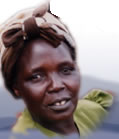 |
 |
||
 |
|||
| RELATED THEMES culture and customs education family life gender social change OTHER LOCAL THEMES BACKGROUND |
social relationships
Traditionally, the seclusion period after circumcision was the time set aside to teach boys and girls about their future responsibilities. Older people played an important role in imparting such knowledge. Although circumcision remains a significant community event, its centrality to everyone's lives has diminished, and with this, so has the active educational role of older people. Formal schooling, the Church and, some say, western culture exert considerable influences on children's lives now. In fact, concern about an increasing lack of control over the young is voiced by several narrators, who link it to the decline in the community's role in educating and disciplining children. In the past, any member of the community could discipline a child, whereas now it is solely the parents' role, and sometimes the teachers' responsibility. As these relationships are changing, some of the older people are beginning to feel marginalised, and their ambiguity towards the effects of modern education is understandable. One narrator believes these disrupted relationships are at the heart of a more general malaise among the Sabaot and feels that the elders should "re-educate" the younger generation, and that they should listen: "We should not despise anybody; we must try to learn something from a cross-section of elders who have different experiences in life" (Kenya 12) . Others say that the Sabaot have been too closed to influence from the outside, and that they should be more open to relationships with other groups, rather than fearing that this will further threaten their sense of stability and continuity. This tension between preserving a strong cultural identity yet being open to learning from others is a common thread in the testimonies. The Sabaot feel that they are isolated physically, economically and politically from mainstream Kenya, and that this severely limits their development options. Many recognise that contact with others can bring new ideas, wider experience and positive influences. Yet, perhaps because their relationship with the Bukusu also brought oppression, many talk of ridding the area of non-Sabaot, express distrust and disapproval of modern influences and fear the loss of tradition. Finding a balance between preserving the strengths of their old way of life without being excluded from the benefits of modernisation is proving difficult, as it does for many culturally distinct groups. quotes about social relationships"The assumption many of our youth make
is that, because they have gone to school they know everything and
cannot therefore be advised by illiterate parents. This kind of
situation has made it difficult for some parents to exercise authority
over their children." "Our children these days spend most of
their time in school, and it is in school that they pick up bad
habits. In school they interact with children from different backgrounds,
and due to peer pressure you find that a child you were trying to
mould into a good citizen changes drastically. When these children
come back home during holidays, they seem to have a lot of contempt
for the way the parents advise them, for they see us as being obsolete
and old fashioned. It is in school that our children actually start
experimenting with drugs, and many of them pick up smoking there.
Therefore it is true that parents are nearly failing in their role
to mould upright youth, because we don't have much time to stay
with our children the way the old generation did. " " But these days, things have changed.
You even find some parents that have deviated from their responsibility,
because when they see their children have learned more than themselves,
they tend to respect the children and even address them as Mzee
and yet these are just their children." |
|
 The changing relationship between the young and the old is often
mentioned, and most older people see it as deteriorating. Modern
education is a key factor and several claim that it is driving a
wedge between children and their non-literate parents and grandparents.
Moreover, the knowledge and expertise older people do have is seen
by some young people as hardly relevant to the modern world. One
narrator describes it as
The changing relationship between the young and the old is often
mentioned, and most older people see it as deteriorating. Modern
education is a key factor and several claim that it is driving a
wedge between children and their non-literate parents and grandparents.
Moreover, the knowledge and expertise older people do have is seen
by some young people as hardly relevant to the modern world. One
narrator describes it as